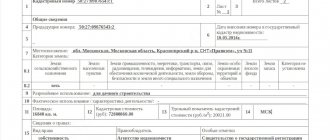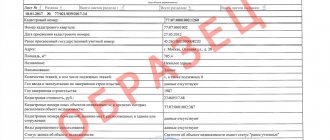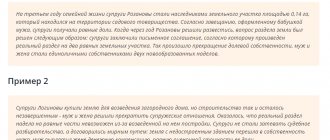With the help of a document such as an agreement on the allocation of a share in property rights, it is possible to achieve a real division of property. This article will focus on property that is in shared ownership (basis - Article 252 of the Civil Code of the Russian Federation): when the shares in the right to it have already been determined - when purchasing housing, land and other objects (specified in the purchase and sale agreement ), donation (in the relevant agreement), as well as in the agreement on determining shares in common property.
The most important thing in preparing for the allocation of a share in property rights and the signing of an agreement is to reach an agreement between the participants. About how to actually allocate a part of the property that corresponds to the size of the share. The nuances of the agreement and methods for allocating a share in property rights will be discussed below; details can be clarified with the duty lawyer.
:
Agreement on the allocation of a share in property rights
An example of an agreement on the allocation of a share in property rights
Agreement on the allocation of a share in property rights
Kotlas, Arkhangelsk region April 19, 2021
We, the undersigned,
Egorov Vladimir Evgenievich, born on March 10, 1967, passport of a citizen of the Russian Federation series 51 17 number 498878, issued by the Department of the Federal Migration Service of Russia for the Sverdlovsk region in the Oktyabrsky district of Yekaterinburg on March 15, 2012, living at the address: Russia, Arkhangelsk region, Kotlas , st. Manokhina, 117, hereinafter referred to as “Side 1” on one side, and
Fateev Dmitry Semenovich, born October 16, 1972, passport of a citizen of the Russian Federation series 43 58 number 777898, issued TOM p. Sovetskoye, Arkhangelsk region, February 20, 2005, living at the address: Russia, Arkhangelsk region, Kotlas, st. Manokhina, 117, hereinafter referred to as “Party 2”, on the other hand, when referred to together, hereinafter referred to as “Owners”,
have entered into this agreement as follows:
- The owners own, by right of common shared ownership, residential building No. 117 at the address: Russia, Arkhangelsk region, Kotlas, st. Manokhin, cadastral number 71:27:83648:287, number of floors 2, total area 152 sq. m., located on a land plot with cadastral number 71:27:83648:28, with a total area of 1200 sq. m. m. The above residential building consists of 4 isolated rooms (20 sq.m., 50 sq.m., 12 sq.m. and 18 sq.m. respectively), 2 kitchens (15 sq.m. and 12 sq.m. ), 2 bathrooms.
- Party 1 owns ¾ of the share in the ownership of the above residential building on the basis of a donation agreement dated 05/11/2016, which is confirmed by the Certificate of Registration of Ownership, series PA number 798 dated 06/20/2016.
- Party 2 owns ¼ share in the ownership of the above-mentioned residential building on the basis of a certificate of inheritance according to the law, series AK number 898782.
- In order to terminate common shared ownership, the owners came to an agreement on the allocation of a share in ownership and the division of a residential building in accordance with technical conclusion No. 47 of the BTI dated 03/10/2018 as follows:
Party 1 owns ¾ of the house's share, consisting of an isolated part of the main building on the ground floor, consisting of living rooms with an area of 50 sq.m., 12 sq.m., 18 sq.m., a kitchen with an area of 12 sq.m., a bathroom on ground floor. The entrance is separate.
Party 2 owns ¼ share of the house, consisting of an isolated part of the main building on the second floor, consisting of a living room with an area of 20 sq.m., a kitchen with an area of 15 sq.m. m., bathroom on the second floor, storage area of 5 sq. m. Entrance – separate, external staircase.
- The division of the land plot was carried out on the basis of a separate agreement.
- The owners have no claims against each other.
- The shared ownership of the Owners in the said residential building is terminated due to the actual division of the common property. The ownership right of each party to the part of the residential building allocated in accordance with the terms of this agreement arises from the moment of state registration of rights by the parties.
- The parties independently bear the costs of registering the right to the part of the residential building and outbuildings belonging to them after the allocation.
- This agreement is drawn up in 3 authentic copies, one for each Party and for the Rosreestr Office for the Arkhangelsk Region.
- Details and signatures:
Egorov V.E.
Fateev D.S.
Do I need to register with a notary?
Lawyers are often asked whether an agreement must be registered with a notary? The question is really relevant. More recently, owners could submit a written agreement without a notary stamp. This practice was in effect until 2021. Now the MFC and Rosreestr require that the agreement be approved by a notary (Article 42 of Federal Law No. 218 of July 13, 2015).
Co-owners don’t even have to rack their brains over composing the text. All actions are performed by a notary, from whom you can find a sample document. Naturally, notary services are paid in accordance with the tariff.
When can an agreement on the allocation of a share in property rights be concluded?
Allocation of a share means division of property. Termination of shared ownership and emergence of individual ownership. Therefore, consider the following features:
- if the thing is indivisible, for example, a one-room apartment, when it is impossible to organize a separate entrance, then division is impossible. But the parties can agree to pay money towards the share. The size is determined by the parties, and if there is no agreement, an appraisal can be carried out
- residential premises are subject to division when it is possible to organize a separate entrance, as well as communications
- the agreement is signed by all participants in shared ownership, even when only one of them makes such a request. The remaining participants can terminate the right of shared ownership by allocating their shares. Or they can allocate a share to one participant, and the rest maintain pre-existing relationships.
Preparing for trial
A citizen who decides to seek the allocation of a share in kind through the courts will need to prepare and submit a package of documentation to the court.
This package includes:
- statement of claim. The claim must indicate the full name of the court to which the claim is being sent, detailed information of the plaintiff and defendant, as well as the essence of the demands made by the citizen. The statement of claim is sealed with the handwritten signature of the citizen filing the claim, indicating the date of signing;
- current version of the technical passport of a residential property developed by the technical inventory bureau;
- title documentation for a residential property, which determines the size of the shares of all owners;
- documentation defining the procedure for operating a residential property (if available).
The list above is not exhaustive. The court has the right to require the provision of other documentation if it considers it necessary when considering the case on the merits.
Collecting and preparing documentation will take a lot of time and money. Therefore, before going to court, you should analyze the benefits of a possible win, comparing them with the costs.
ATTENTION! Look at the completed sample claim for allocation of a share:
Contents and form of the agreement on the allocation of a share in property rights
Before drawing up the document, it is necessary to obtain a BTI opinion on the possibility of real division of property (for real estate). Agree with all participants on the method of dividing the property, the actual value of the shares, the need to pay monetary compensation (when the real part of the property turns out to be more or less than the value of the share in ownership).
Write down all the details in the agreement. On the basis of what documents does each of the participants own the right of ownership, the size of the shares, how the share is allocated, indicating the list of property (possibly with an assessment of its value), all auxiliary buildings and premises. If it is necessary to re-equip the premises, obtain the appropriate permits. Compensations, expenses for state registration and further according to the example.
An agreement on the allocation of a share in property rights is drawn up in simple written form and does not require notarization, but is subject to state registration.
Resolving the issue through a judicial authority
Before going to court, you should realize that the court does not always make decisions in favor of the plaintiff. This is especially true in situations where the allocation of a share in kind may cause damage to the property.
In this case, there is only one way out - the initiator of allocating a share in kind buys shares in the property from the remaining owners.
Please note! Before going to court with a claim for the allocation of a share in kind, you should carry out a technical inspection of the residential property and establish:
- the percentage of physical wear and tear of this object;
- market value of the residential property;
- the possibility of allocating in kind a share in a residential real estate property from common property in compliance with all the requirements of the current legislation of the Russian Federation;
- residential real estate redevelopment project.
The court will consider the results of the technical check and other documents submitted, after which a decision will be made to allocate a share in kind or to refuse to allocate a share in kind.
The time frame within which the court will make a decision depends on the number of examinations carried out and the volume of documentation submitted for consideration. Let us note that owners who do not want to allocate a share in kind can significantly slow down the process by requesting various independent examinations.
Responsibility for an obligation
If parents have not established shares for their children, then they will face appropriate punishment. Illegal actions with a certificate may result in criminal liability. If, for example, adults cashed out the funds from a certificate issued to them, then they risk being imprisoned for a period of 24 months to 5 years.
Here are a few more consequences that parents who have not established a share of maternity capital for their children may face:
- court order imposing punitive damages;
- cancellation of a transaction involving the purchase and sale of housing;
- compulsory allocation of a share to the child with the help of a SSP employee.
Basic information
After the birth of a second child, the state issues maternity capital to parents. For many families, this amount of money is significant support for improving their living conditions.
From January 2021, certificates began to be issued to families in which the first child was born.
However, domestic legislation establishes a strict list of possible options for using these funds. Parents do not have the right to spend the allocated amount at their own discretion. If they cash out funds from maternity capital and use the money for other purposes, they will face certain punishment, including criminal liability and imprisonment for up to 5 years .
Parents can use maternity capital either immediately after receiving the appropriate certificate or after the expiration of a 3-year period.
If adults decide to purchase real estate using maternity capital funds, then children are required to receive shares in the housing.
As for the subsequent sale of housing, adults must draw up a document containing information about the minor receiving an equivalent share in another apartment. After the sale of the old home, the mother and father register the child in the new apartment.
Selling a house with maternity capital
How is jurisdiction determined?
Based on the norms of the current legislation of the Russian Federation, civil cases, depending on the size of the claims, fall under the jurisdiction of magistrates’ courts or courts of general jurisdiction.
Claims related to real estate objects are filed with the courts at the location of these objects. If the cost of the claim does not exceed 50,000 rubles, then the claim is sent to the magistrate's court. If the value of the claim is more than 50,000 rubles, then the claim is filed in a court of general jurisdiction.
State duty when filing a claim
The amount of state duty that a citizen filing a claim for the allocation of a share in kind will need to pay depends on the cost of the claim.
Based on the norms enshrined in paragraph 1 of part 1 of Article 333.19 of the Tax Code of the Russian Federation, the amount of the state duty is:
| Cost of claim | Amount of state duty | |
| lower limit | Upper limit | |
| 1 ruble | 20,000 rubles | 4% of the cost of the claim and not less than 400 rubles |
| 20,001 rubles | 100,000 rubles | 800 rubles + 3% of the amount over 20,000 rubles |
| 100,001 rubles | 200,000 rubles | 3,200 rubles + 2% of the amount over 100,000 rubles |
| 200,001 rubles | 1,000,000 rubles | 5,200 rubles + 1% of the amount over 200,000 rubles |
| 1,000,001 rubles | — | 13,200 rubles + 0.5% of the amount over 1,000,000, but not more than 60,000 rubles |









